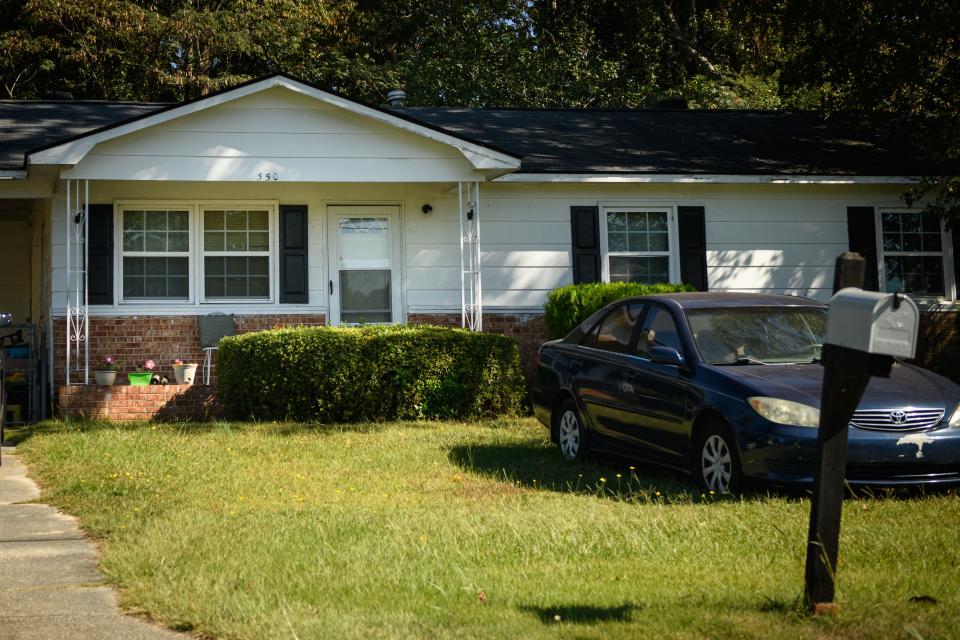Did a Fayetteville woman legally shoot her neighbor? Why she was awarded a new trial
Did a Fayetteville woman break the law when she shot and wounded a neighbor who appeared at her front door one Easter afternoon? Or was the woman lawfully defending herself?
A Cumberland County jury in May 2022 concluded that the woman, Angela Benita Phillips, was wrong and convicted her of assault with a deadly weapon inflicting serious injury. Her prison sentence was a minimum of two years and one month to a maximum of three years and six months. This was the maximum possible punishment, the trial transcript says.
But last week, the North Carolina Court of Appeals overturned the conviction and awarded Phillips, 42, a new trial. A new jury could find her not guilty.

The three judges on the Court of Appeals panel voted 2-1 that the trial judge gave an incorrect instruction to the jury on how to apply self-defense law to the evidence. The majority said that instruction led the jury to a guilty verdict when it might otherwise have found Phillips not guilty.
The issues involve North Carolina’s “Castle Doctrine” and “Stand Your Ground” laws, which specify when a person is legally allowed to use force to defend herself, and when she may legally escalate that force to deadly force.
Unneighborly conduct
Phillips shot her neighbor who lived across the street, Latonya Terrell Dunlap, with a Glock handgun shortly before 2 p.m. on April 4, 2021, Easter Sunday. This was on the front porch of Phillips’ home on Longhorn Drive, in the Ponderosa area off Yadkin Road and Bonanza Drive near Fort Liberty.
Dunlap had not known Phillips before she went to Phillips' door, Phillips’ lawyer said in a legal brief.
“She had crossed the street to confront her neighbor because she believed that Ms. Phillips had complained to the landlord about her,” the lawyer wrote.
Documents say Dunlap was unarmed.
The state’s brief said there was conflicting testimony from witnesses as to whether Dunlap was drunk and whether she was angry when she went to Phillips’ door. Some people said she “knocked” and others said she loudly “banged on” the door.
Phillips testified she took her gun to the door because she did not know who was there.
The state’s brief says another neighbor who saw the shooting, Tracey Marsh, testified that when Phillips came to the door, the women briefly argued and Phillips slapped Dunlap.
Dunlap fell backward, Marsh testified, then moved forward as though she were trying to regain her balance and avoid falling off the porch. Then Phillips fired three shots, he said. Dunlap never physically attacked or tried to grab the gun from her hand, he said.
Dunlap testified, the brief says, that when she first saw Phillips and tried to talk to her about the landlord, Phillips said, “I’ve been waiting on you, (expletive),” and shot her.
Philips testified in her own defense. Her lawyer’s brief says she told the jury that after she hit Dunlap, Dunlap “‘streaked over to jump on’ her.” And that’s when she shot Dunlap.
One of the shots grazed Dunlap’s head, a police document says, and the others hit her torso. She suffered injuries to her spleen, colon, pancreas and kidney, it says. The state’s brief said Dunlap needed multiple surgeries to treat the wounds.
Did the judge get it wrong?
In the majority opinion of the Court of Appeals ruling, Judge Jeffery Carpenter said Cumberland County Senior Resident Superior Court Judge Jim Ammons gave an improper instruction to the jury on the concept of excessive force in self-defense cases.
Self-defense law generally allows a person standing her ground and defending herself to use only enough force to eliminate a threat. Deadly force may be considered excessive if it is used to counter nondeadly force. For example, in the early 2000s in Cumberland County, a woman was convicted of manslaughter for shooting to death a man who was punching her husband.
However, a person is allowed to use deadly force if she reasonably believes someone is illegally trying to break into her home. This is known as the Castle Doctrine (as in, “your home is your castle”).
Ammons in his jury deliberation instructions told the jurors, “a defendant does not have the right to use excessive force.” This was a mistake, Carpenter said, because the jury could have decided Phillips was defending herself from Dunlap under the Castle Doctrine, which allows deadly force.
So Phillips is entitled to a new trial, Carpenter wrote.
Court of Appeals Judge Michael Stading concurred with Carpenter.
Or did the judge get it right?
Appeals Court Judge Toby Hampson dissented, saying that Ammons included the Castle Doctrine in his instructions to them, so there was no error and the jury’s conviction should stand.
Ammons told the jury, “If the defendant assaulted the victim to prevent a forcible entry into the defendant’s home or to terminate the intruder’s unlawful entry the defendant’s actions are excused and the defendant is not guilty,” Hampson wrote.
Since the Court of Appeals was not unanimous, the case may be reviewed by the North Carolina Supreme Court, which could overrule the Court of Appeals.
Senior North Carolina reporter Paul Woolverton can be reached at 910-261-4710 and pwoolverton@fayobserver.com.
This article originally appeared on The Fayetteville Observer: Fayetteville NC woman who shot neighbor wins new self-defense trial

